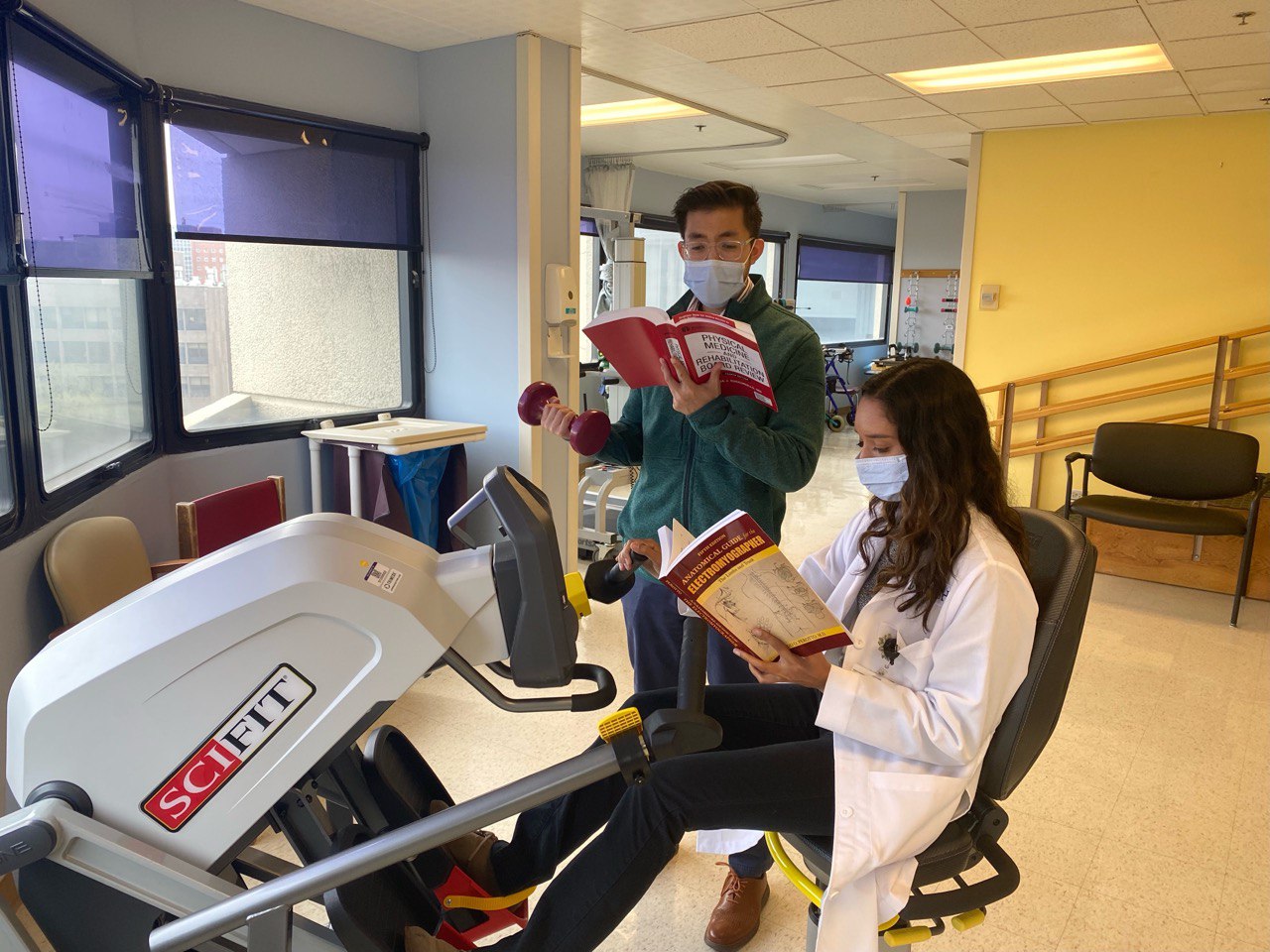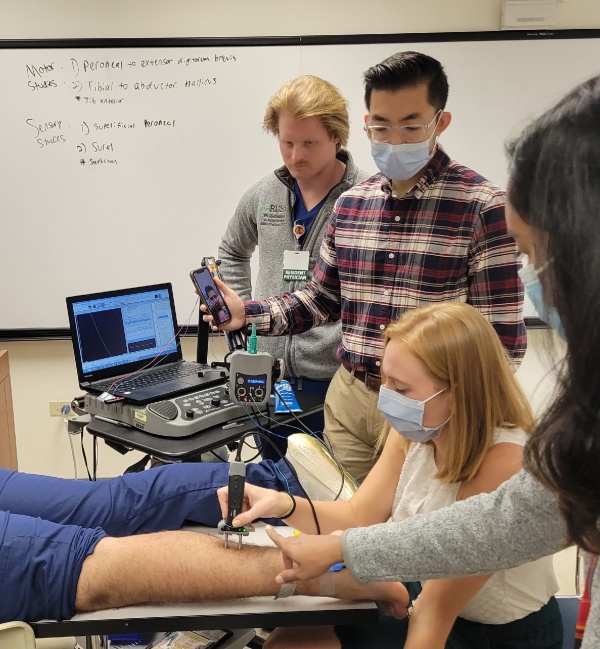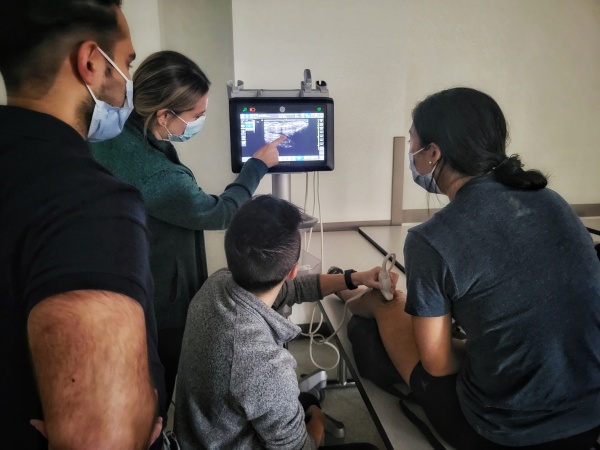Our educational programming is broken up into multiple components:
- Formal Didactics
- EMG/US Workshop Series
- Grand Rounds
- Chairperson's Rounds (Health Equity, Disability Advocacy, Career Development)
- Board Preparation (Written & Oral)
- Safety Rounds
- Secondary Degrees
Formal Didactics

The formal didactic educational curriculum is organized monthly with each month dedicated to a specific rehabilitation topic (e.g. August is Stroke month) with all faculty participating periodically throughout the year based upon their clinical interest and specialty. Rather than a traditional ‘lecture,’ we have taken a cue from our Medical College and transitioned our education into a Flipped Classroom Model with Case-Based Small Group Learning Sessions (i.e. PBL/EBL) lead by our faculty. Residents are required to read the assigned reading materials to prepare for a discussion group within their PGY class and/or the entire residency. At the conclusion of each month, residents are given a quiz with questions written by the faculty participants for the month as a means for residents to monitor their educational process in addition to helping the practice answering test questions for written boards

EMG curriculum didactic session occurs over a 6 month period in the months of March and April. Prior to that time, the residents have periodic practice sessions timed in conjunction with the MSK ultrasound program. Prior to their first EMG rotation, Junior residents meet with Senior residents to ensure they understand the basics of EMG technique and philosophy for common conditions (i.e. carpal tunnel syndrome, radiculopathy)

The MSK Ultrasound Curriculum is spearhead by Dr. Rachel Welbel, a Sports Medicine Fellowship Trained physician. The program consists of monthly hands-on educational session in addition to informal practice sessions between formal sessions. The department has partnered with the Anatomy lab to have quarterly Anatomy Sessions for residents to practice for US-guided injections on cadavers. The residents rotate with multiple faculty who have integrated ultrasound into their practice.
Grand Rounds
Residents are required to give a Grand Rounds presentation each year to an audience of our core and associated faculty in addition to the entire interdisciplinary rehabilitation team (PM&R, PT, OT, SLP, Psychology, etc) from the Chicago Medical District (RUSH, University of Illinois, and Cook County Hospital). Residents are given support via their Mentors and are encouraged to pick topics of their clinical interest particularly if they are thinking of pursuing a fellowship in that field.
Monthly rounds supervised by our Chairperson, Dr. Sheila Dugan, that has sessions focused on Research, Health Equity, Disability Advocacy, and Professional Development. The rounds are informal discussions on a variety of topics that are not normally covered in residency or clinical rotations as follows:
Sessions are co-run by Karla Wente, PhD candidate at Rush, and are comprised of discussion of a variety of research topics including how to how to formulate a research question, design a study, submit an IRB, etc. Residents who are conducting research projects present their progress quarterly for feedback.
Professional Development sessions are spearheaded by Alumni who speak about post-graduation opportunities. Topics in the past have include contract negotiation, work-life balance, alternative revenue streams, billing and coding, etc
These sessions are co-run with Dr. Ravi Kasi and encompass a variety of Disability Topics based upon a running PowerPoint slide deck (click link) developed over the last few years.
Invited speakers from RUSH University's robust Health Equity Program have discussed about Cultural Competency for the diverse population served at the Medical Center, Health Care Disparities, Population Health. The program is conducted in collaboration with the Health Equity Track offered for all residents in the medical center
Board Preparation (Written & Oral Boards)
Each Spring, the program coordinates a Mock Oral Boards (Part II) with faculty proctors for the current PGY4 and the recently graduated residents who are preparing for Mock Oral Boards. Mock Orals are also including during the monthly lecture series. Written boards (Part I) education is integrated into the didactic learning - see above. The program also purchases online Board Review Question Bank (PMR Recap), Video Lecture Series, and Textbooks for each resident.
Safety Rounds
Safety Rounds occurs once a month and provide education regarding safety issues in both Acute Inpatient Rehabilitation and Outpatient Clinics. The education mimics the topics of the didactic lectures (i.e. TBI related safety issues are discussed during the TBI month). The rounds are organized as follows:
- Review of acute transfers and near-miss / safety events from Acute Inpatient Rehabilitation and/or Outpatient Clinics. Discussion involves root-cause analysis in addition to creating action items to be relayed back to the Administrative Teams
- 5-10 minute lectures on medical topics relating to safety (i.e. acute management of Sepsis)
- 20 minute lecture on broader educational topic relating to safety from an invited speaker (i.e. DM management)
Secondary Degrees and Certification Program
Due to our proximity to the Medical College, the program offers Masters Programs and Certification Programs as detailed in our 'Fellowship Matching and Career Development' page
